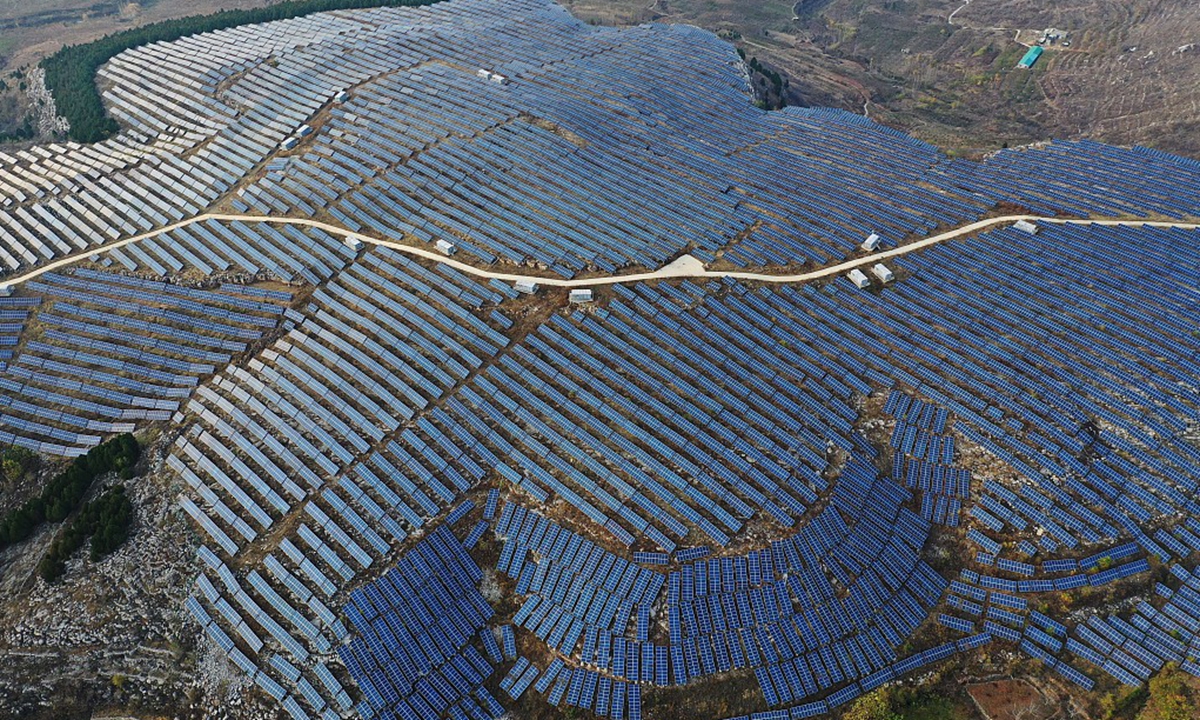
Photo: CFP
On the premise of ensuring energy security, China will accelerate the pace of coal reduction during the 14th Five-Year Plan period (2021-25) and raise the share of non-fossil energy consumption to about 20 percent, according to a document released on Sunday.
The guidelines published on Sunday by the Central Committee of the Communist Party of China (CPC) and the State Council on further promoting the battle against pollution, accelerating green and low-carbon development was among the main drivers.
According to the guidelines, by 2025, CO2 emissions per unit of GDP will drop by 18 percent compared with 2020, the environment will continue to improve and the total discharge of major pollutants will carry on decreasing.
By 2035, green working and living norms will be widely adopted, carbon emissions will be stable and moderate after reaching its peak and the goal of building a beautiful China will be basically achieved.
The target is in line with an action roadmap of
China's dual carbon goals of reaching peak carbon emissions by 2030 and achieving carbon neutrality by 2060 released by the central government on October 26.
To reach the targets, China will strictly control the growth of coal consumption and will strive to produce energy with non-fossil sources accounting for more than 20 percent. The country will also achieve ultra-low carbon emissions in steel and coal-fired power units and boilers in key areas. The national carbon emission trading market will be improved and its coverage will be expanded in an orderly manner
The guidelines specifiy that in the next five years, coal consumption in the Beijing-Tianjin-Hebei region and surrounding areas should be reduced by 10 percent from the 2016-20 period and in the Yangtze River Delta, one of the most economically developed regions in China, should decrease by 5 percent.
Coal consumption in the Fenhe-Weihe river basin, a major coal production area that includes North China's Shanxi Province, Northwest China's Shaanxi Province and Central China's Henan Province, is planned to record negative growth by 2025.
Meanwhile, China will continue to increase the use of natural gas, especially in heating. The proportion of electricity in total energy consumption will also be increased.
According to the latest statistics from the General Administration of Customs, China has imported 99.074 million tons of natural gas in the first 10 months of 2021, up 22.3 percent year-on-year.
On November 4, China inked
the largest ever liquefied natural gas deal with the US, with annual imports of 4 million tons of natural gas for 20 years.
The guidelines said that China will promote the application of hydrogen fueled vehicles and clean energy vehicles in an orderly manner. The use of electric vehicles in public transport in large and medium-sized cities will be promoted.
The monitoring technology and emission calculation methods of volatile organic compounds will be improved, and when relevant conditions are mature, volatile organic compounds will be included in the scope of environmental protection tax, read the guidance.

Photo: CFP
On the premise of ensuring energy security, China will accelerate the pace of coal reduction during the 14th Five-Year Plan period (2021-25) and raise the share of non-fossil energy consumption to about 20 percent, according to a document released on Sunday.
The guidelines published on Sunday by the Central Committee of the Communist Party of China (CPC) and the State Council on further promoting the battle against pollution, accelerating green and low-carbon development was among the main drivers.
According to the guidelines, by 2025, CO2 emissions per unit of GDP will drop by 18 percent compared with 2020, the environment will continue to improve and the total discharge of major pollutants will carry on decreasing.
By 2035, green working and living norms will be widely adopted, carbon emissions will be stable and moderate after reaching its peak and the goal of building a beautiful China will be basically achieved.
The target is in line with an action roadmap of
China's dual carbon goals of reaching peak carbon emissions by 2030 and achieving carbon neutrality by 2060 released by the central government on October 26.
To reach the targets, China will strictly control the growth of coal consumption and will strive to produce energy with non-fossil sources accounting for more than 20 percent. The country will also achieve ultra-low carbon emissions in steel and coal-fired power units and boilers in key areas. The national carbon emission trading market will be improved and its coverage will be expanded in an orderly manner
The guidelines specifiy that in the next five years, coal consumption in the Beijing-Tianjin-Hebei region and surrounding areas should be reduced by 10 percent from the 2016-20 period and in the Yangtze River Delta, one of the most economically developed regions in China, should decrease by 5 percent.
Coal consumption in the Fenhe-Weihe river basin, a major coal production area that includes North China's Shanxi Province, Northwest China's Shaanxi Province and Central China's Henan Province, is planned to record negative growth by 2025.
Meanwhile, China will continue to increase the use of natural gas, especially in heating. The proportion of electricity in total energy consumption will also be increased.
According to the latest statistics from the General Administration of Customs, China has imported 99.074 million tons of natural gas in the first 10 months of 2021, up 22.3 percent year-on-year.
On November 4, China inked
the largest ever liquefied natural gas deal with the US, with annual imports of 4 million tons of natural gas for 20 years.
The guidelines said that China will promote the application of hydrogen fueled vehicles and clean energy vehicles in an orderly manner. The use of electric vehicles in public transport in large and medium-sized cities will be promoted.
The monitoring technology and emission calculation methods of volatile organic compounds will be improved, and when relevant conditions are mature, volatile organic compounds will be included in the scope of environmental protection tax, read the guidance.





